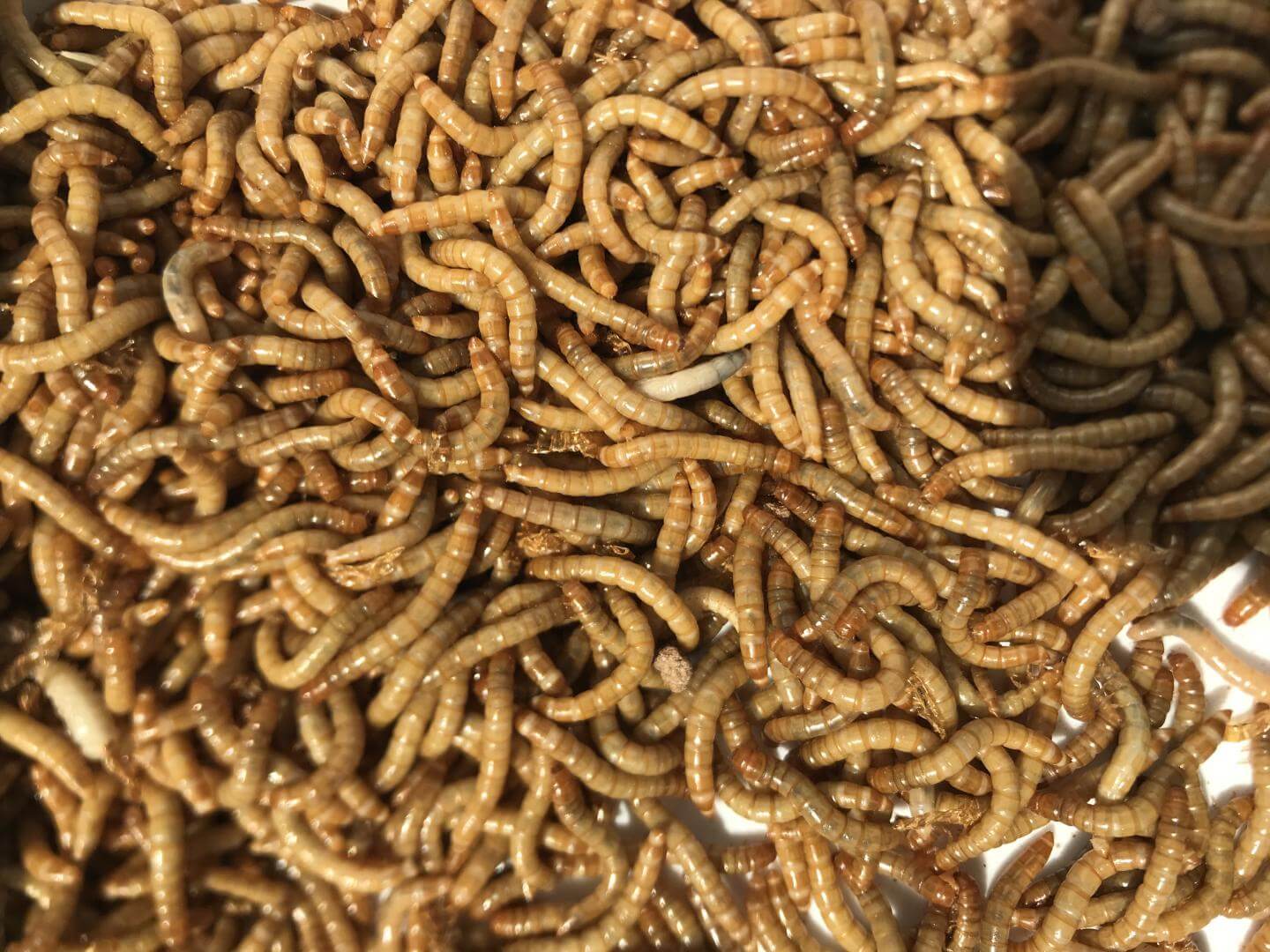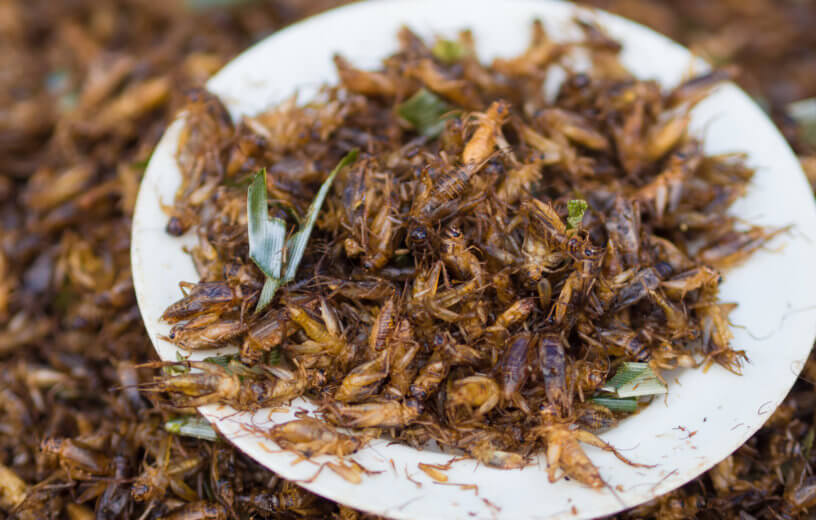URBANA, Ill. — Are insects the sustainable protein source of the future? The prospect of chowing down on crickets and mealworms for dinner may still repulse millions of Westerners, but new research suggests the health benefits may be undeniable. Scientists at the University of Illinois report replacing traditional protein sources with mealworms in high-fat diets may help slow weight gain, improve immune responses, reduce inflammation, enhance energy metabolism, and even improve one’s ratio of good to bad cholesterol. These findings are based on experiments conducted using mice.
“In addition to more dietary fiber, nutritionists also recommend eating more high-quality proteins as part of a weight management plan. We knew from an earlier study in roosters that mealworms are a high quality, highly digestible protein source that’s also environmentally sustainable,” says lead study author Kelly Swanson, professor in the Department of Animal Sciences and interim director of the Division of Nutritional Sciences, both in the College of Agricultural, Consumer and Environmental Sciences (ACES), in a university release.
The research team fed a group of mice a high-fat diet (46% calories from fat) featuring casein, a protein from dairy, for three months before switching to alternative proteins. Meanwhile, a control group consumed a lean diet with casein throughout the experiment. By the time the team introduced mealworms, the high-fat diet group was obese and experiencing metabolic syndrome — a cluster of conditions known to increase the risk of heart attack, stroke, diabetes, and other health problems.
Next, the rodents began eating two types of mealworms in a dried, powdered form similar to flour, substituting either 50 or 100 percent of the casein in the diet. During and after eight weeks spent on the experimental diets, study authors measured body weight, body composition, and blood metabolites, as well as the gene expression of the liver and adipose (fat) tissue.
Interestingly, while mealworm protein didn’t lead to obese mice losing weight, their rate of weight gain did slow relative to other mice consuming high-fat diets with casein. The team also noted additional benefits.
“It’s not a weight loss situation; they just slowed their gain with the mealworms,” Prof. Swanson comments. “The more significant impact was the improvement in their blood lipid profiles. Their LDL, so-called ‘bad cholesterol,’ went down and the HDL, ‘good cholesterol,’ went up. And from a gene expression perspective, inflammation went down and some of the lipid and glucose metabolism genes were altered. Not everything was positive, but metabolically, they were in a better place.”

Some observed benefits may have been tied to chitin, a fibrous material that makes up the exoskeleton of insects. Prof. Swanson notes, however, that the role of chitin hasn’t been well studied. Still, the material appears to act like a fiber, stimulating beneficial microbial activity in the gut. Prof. Swanson is currently working on another study characterizing the effects of mealworms on the mouse microbiome.
While prior studies have analyzed alternative proteins for obesity weight management in mice, most have relied on genetically altered mice designed to stay obese no matter what. In this case, researchers intentionally chose to use “wild type” mice so that they would gain weight the same way many humans do — through their diet.
Health benefits are great and all, but are most people ready to sit down and eat insects for breakfast, lunch, and dinner?
“There’s a ‘yuck factor’ for many in Western societies, where eating insects is not quite normal, but some populations have relied on insect proteins for millenia,” Prof. Swanson adds. “With protein shortages becoming a reality, there may be a place for insect meals.”
For now, mealworm protein is not approved by the U.S. Food and Drug Administration. However, the insect-curious can try cricket flour, which is acceptable for use in foods according to the Food, Drug, and Cosmetic Act.
“You’re not seeing legs or anything like that,” Prof. Swanson concludes. “It’s just a flour that shouldn’t negatively impact the taste or other properties of foods.”
The study is published in the Journal of Nutrition.
You might also be interested in:
- Cricket juice healthier than orange juice? Insects loaded with antioxidants, research shows
- Eat green, live longer: Study finds eco-friendly diets also promote longevity
- Beetleburgers could soon reach mass production — helping to feed the world


Early to mid ’60s some upscale stores sold insects as snacks, prepared and packaged. I thought it was a good idea and sometimes bought some but apparently they didn’t sell well enough and were soon unavailable.
This isn’t a new idea. The problem now is that you guys are overdoing it, which makes it unappealing to people. (See? You won’t get fat as fast.) As you see from the previous example making it “upper class” food didn’t work.
Just put them out for sale and don’t push them.
Oh brother …. why is the media trying so hard to hype this idea of eating insects? How nutritious they want us to think they are. Or they will help you lose weight – why, because you hate the idea of eating insects? What next – cancer prevention by eating insects. Boost your brainpower by eating insects.
Just stop this line of research or what will happen is that we will have 2 classes of people on earth – those who can eat the remaining actual decent human food, and the masses of people who because of global warming, famine, disasters will be forced to eat insects.
All these weirdo foods like fake meat, cultured animal tissue, insects, bacteria … these are ultra-ultra processed foods that are not fit for consumption.
I am reminded of the line – you are what you eat – and no group of human beings should be insects. Blechkkkk!
Get scientists working on fixing global warming and effective birth control – not eating bugs, yuck!
Pure fu#king propaganda.